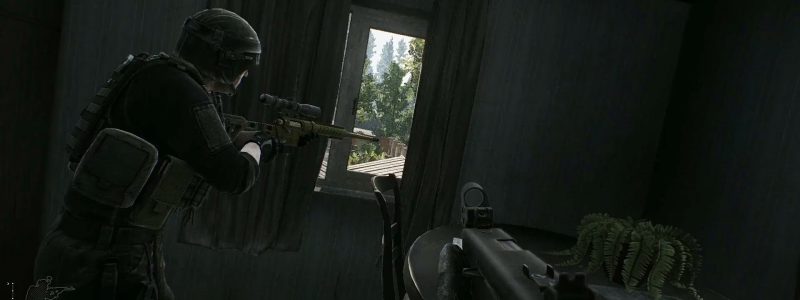This is a topic that has been grinding my gears for years, so I took some excerpts from a post I wrote years ago for another shooter and updated them to explain why push-to-talk matters in Escape From Tarkov in particular:
Ready or not, it's time for some science.
- The Cocktail Party Effect:
This is self-explanatory if you're familiar with the effect, but it is well known that it is difficult in situations where you're impaired (by alcohol, stress, fight or flight response, etc.) to isolate sounds you're trying to be selectively attentive toward if you're hearing audio from multiple sources – particularly tactically irrelevant audio. In this respect, communicating too much is scientifically worse than not communicating at all.
- Faster Reaction Times:
It's not click bait, it's real: You can improve twitch skill during gameplay by lowering reaction times 200-400%.
Studies have shown that people can respond to something they hear 200-400% faster compared to something they see. They accomplished this by measuring auditory reaction times, or ARTs, then comparing them to visual reaction times, or VRTs, for the same people. However, you can only respond faster to something you hear if it can be heard. Because of things like the cocktail party effect, we know it's easier to hear something if it is the only auditory stimuli presented. Otherwise, we will have to try to isolate the sounds we're listening for from the multiple sounds we're hearing.
- Stay In The Zone:
If you know anything about Flow States, those times when people are at their peak performance, you might be interested to learn that based on recent studies using technologies like fMRI and qEEG, scientists have learned that these flow states are characterized by a greater proportion of alpha waves relative to other types of waves. However, when you are (1) thinking about what you want to say, (2) speaking with someone or to yourself via internal monologue, (3) listening to someone else speak to you, studies have shown our brains produce a higher proportion of beta waves. This occurs even when listening to a podcast or video, where you hear other people talking but aren't a participant in what you hear. Should it really come as any surprise that scientific research confirms a strong, positive correlation between the presence of distracting auditory stimuli and prevalence of error rates and inattention?
- Multi-Tasking Isn't Real:
Task switching costs have higher latency than any gamer would accept in server ping.
Would you as a gamer or anyone you know prefer playing on a server with your friends if everyone's server ping was 2000ms (milliseconds) or higher, relative to a server with ~100ms ping or less? If you've answered honestly, it's an emphatic, resounding 'No!'.
While the human mind is extremely complex and capable of many feats, multi-tasking is not one of them. If you visit PubMed or any other academic journal or scientific research search engine, you'll find that multi-tasking is usually only found in keywords where the title of the study seeks to prove the aforementioned or the author is writing figuratively. Multi-tasking in this context is referred to as 'task switching' by researchers for a reason. While humans can't multi-task, we are usually very good at switching between tasks quickly. Or, at least quickly enough to mistakenly believe we can multi-task, provided we don't critically investigate that claim with scrutiny. Admittedly, results for this sort of research vary when reproduced to a degree. However, two consistent findings in each study is that (1) task switch costs exist and that (2) task switch costs are higher when switching between different tasks.
Listening for enemy footsteps, relaying the location of yourself or a friendly or enemy player and scanning a tree line for enemy infantry are all different tasks in this context, but one of these three tasks I've given as an example are more different than others (ref. 1a). Similarly, switching between listening to a squad member narrate the entirety of their in-game experience in Squad Comms before going back to what you were supposed to be doing in-game is a great shortcut to a black screen. In the aggregate, this often adds up to a team loss, unless of course the enemy team happens to derp harder than yours has.
If you want an ELI5 example, start a stopwatch timer in Windows or on your phone and try counting from 1 to 10 and then saying all of the letters in the alphabet from A to J. Stop the timer after you've done this and record the result. Then start a new stopwatch timer and try saying 1 followed by A, 2 followed by B, etc., until you get to 10 and J. Divide the two results (in seconds) to see how much slower you took during the second round.
- Less Is More:
Standardizing stimuli, including communications, allows us to respond faster to them.
This should be common sense to most folks reading this and is one of the many reasons virtually every military in the world has multi-service tactical brevity codes. By sorting out what you want to say before you say it, saying it quickly and saying it the same way everyone else saying anything says it, you can begin to respond faster to callouts and other relevant communication. Remember, a reflex is an action performed to a stimulus without conscious thought. The more you and your teammates have to think about, the faster you can act and react.
I'm not advocating for a MilSim approach to the game.
All I'm saying is the filthiest casual can kill, loot and extract more successfully with this one trick: say less.
Source: https://www.reddit.com/r/EscapefromTarkov/comments/egj3zq/why_pushtotalk_ptt_matters/







